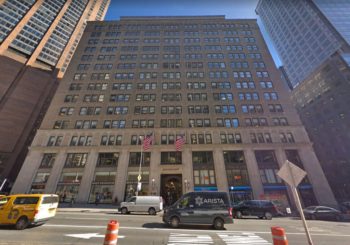
One Park Avenue. Image Credit: Google Maps
City Tax Appeals Tribunal determined transfer was not eligible for special reduced rate. One Park Avenue Mezz Partners LLC, a subsidiary of industry giant Vornado Realty Trust, held a 100 percent equity interest in a commercial building located at One Park Avenue in Manhattan. In March 2011, while looking to refinance the building, Vornado had that equity interest transferred in full to two new subsidiary real estate investment trusts. The compensation was roughly $5.6 million ($2.25 million in cash and $3.375 million in the form of ownership stakes in the grantee trusts).
The New York City Real Property Transfer Tax law halves the tax rate for certain transfers between real estate investment trusts (from 2.625 to 1.3125 percent). The trusts reported the transaction to the Department of Finance and, operating under the assumption that this particular deal qualified, paid the reduced rate. The transfer tax amounted to approximately $6 million in total. After auditing the transaction, Finance levied an additional $10.8 million in transfer tax, plus interest. Finance concluded that the transfer did not qualify for the reduced rate because it failed the so-called 40% Test, the colloquial name for New York City Administrative Code §11-2102(e)(2)(C), which governs eligibility for the reduced Real Property Transfer Tax rate. The 40% Test requires, among other things, that the value of ownership interests in newly-formed real estate investment trusts conveyed as consideration be at least forty percent of the equity value of the grantor’s transferred equity interest. For the purposes of applying the 40% Test, the equity value is the difference between the total taxable consideration and the unpaid principal balance of preexisting mortgages or loans secured by the building. By Finance’s calculation, the $3.375 million value of trust shares fell short of the requisite threshold.
The trusts filed an administrative appeal, arguing that the equity value be calculated in the market value of the property as estimated by the Department of Finance in its most recent property tax assessment.
The New York City Tax Appeals Tribunal rejected the trust’s position and determined that the transfer at issue was ineligible for the reduced rate because the 40% Test was not satisfied. There was no indication, either textual or in the legislative history, that the City Council intended for estimated market value to supersede the standard definition of taxable consideration. In the absence of any such indication of legislative intent, which other sections of the Real Property Transfer Tax Law had, the presumption ran against the narrower reading proffered by the trusts.
The Appellate Division, First Department unanimously confirmed the Tribunal’s determination and dismissed the petition, holding that the Tribunal had correctly applied the 40% Test in arriving at the conclusion that this transfer did not satisfy the requirements for the reduced Real Property Transfer Tax rate. The transferor was thus liable for the normal transfer tax rate.
(CIT) In re VCP One Park REIT LLC v. NYC Tax Appeals Tribunal, 99 N.Y.S.3d 261 (1st Dep’t 2019).

